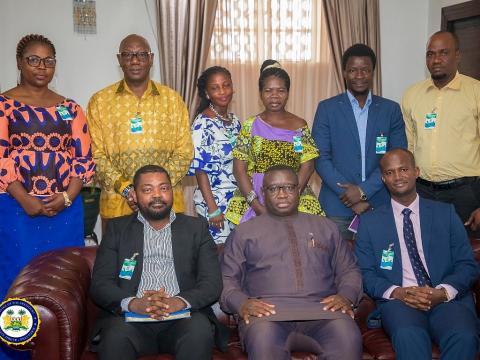By Kemo Cham
The Executive of Sierra Leone Association of Journalists (SLAJ) on Wednesday met with President Julius Maada Bio for the first time since their election into office last July.
The meeting held at State House provided a platform for the SLAJ leadership to thank the President for his government’s effort to repeal the obnoxious criminal libel law.
The Criminal Libel Law is contained in Part V of the 1965 Public Order Act which criminalises libel. Free speech groups and journalists say the law is an obstacle to holding government to account as it prevents citizens to express themselves freely.
Successive governments have used it against its opponents, and journalists have been the biggest victim as many of them have been detained using the law.
Bio campaigned on the promise of repealing the part containing the criminal libel law. Although the process has lasted longer than many journalists expected it, the level of discussion around it has nonetheless raised hopes among campaigners.
SLAJ President, Ahmed Sahid Nasralla, said at the State House meeting that the umbrella journalist body recognised the commitment of government towards the repeal of the law, noting that for the first time in the history of the fight against the law it had now gained cabinet approval, according to press statement from the presidency following the meeting.
“We want to commend Your Excellency for marching your words with action and we believe that the repeal of the criminal libel law will help to create a turnaround for the more responsible and productive media. Let me also thank you for the various appointments you have allocated to some of our colleagues in the media and for the annual subvention that you promised which we have started receiving,” Nasralla was quoted saying.
President Bio congratulated the new executive while commending the outgone one for a smooth transition. The president said the media being a critical voice in society must be part of the governance process, noting that it was a collective responsibility to ensure that democracy and development thrived in order to fix the nation. Bio stated that it was a joint responsibility of all other stakeholders, not just journalists, to work together to identify the critical challenges in society and to also prescribe solutions that were sustainable. He said constructive criticism was an important part of any democratic process because it provided the necessary checks and balances and also led to accountability.
Bio however warned against the potential for abuse of free speech when it will have been decriminalized.
“People have to be mindful on how they use the media to ensure that they are not misused because people are mindful and sensitive of their reputation. As the representative group, you have to be mindful and make sure that it is not misused because reputations are difficult to build but very easy to destroy,” he said.
Copyright © 2019 Politico Online









